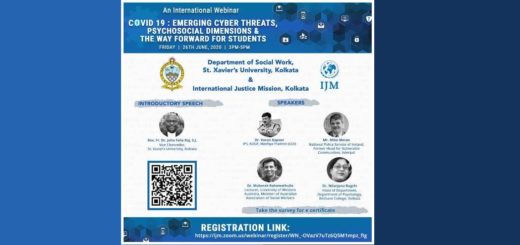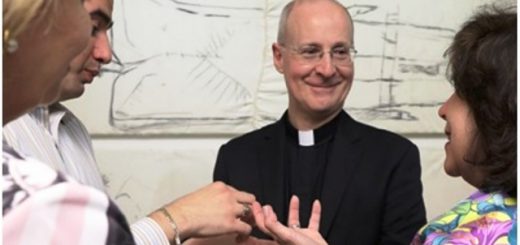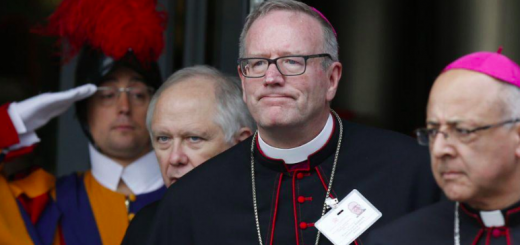Shake-up! Will World Order Soon Collapse?
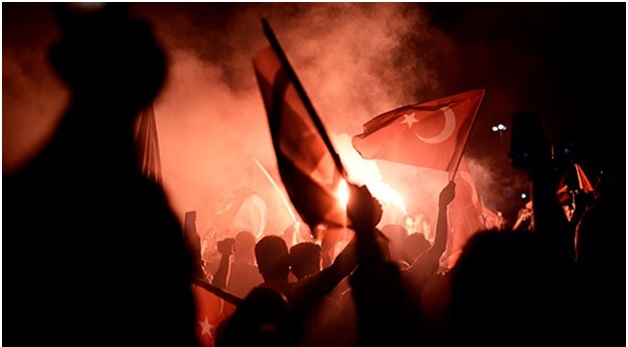
BY DR. JAMES F. PASTOR, PH.D., J.D. In The Real Truth Magazine, Sept.1, 2016
Islamic terrorists slaughter hundreds across Europe and America. Violent political factions vie for control after decades-long regimes fall in the Middle East. Citizens pit themselves against governments as civil disarray increases. The established world system—its normal order—is being shaken to its core. The bombardment of bad events leaves many wondering how long it can last.
(Note: This article is all about contemporary happenings around the world. It is published in the Sept. issue of The Real Truth Magazine, of the Restored Church of God, which proclaims: “Our commission is to preach the gospel of the “Kingdom of God” (Matthew 24:14), teach the full truth to “all nations” (Matthew 28:19-20)—and “cry aloud, spare not” (Isaiah 58:1) and “warn” (Ezekiel 33:1-19) the world of what is coming and why!
“The Real Truth restores plain understanding of the problems, symptoms and causes behind the bad effects reflected in today’s headlines—and points to the GOOD NEWS of the only possible solution, now just over the horizon! In short, we announce the gospel – the “Good News” – of the soon-coming kingdom of God! Therefore, The Real Truth does not take a political position, or side with or against men’s governments or leaders. Our position is strictly neutral.”
 This article makes a critical study of political upheavals, turmoils and highlights in the middle East starting with the Bush blunder in Iraq, dethroning of Muammar Gaddafi in Lybia, downfall of Egyptian Dictator, Hosni Mubarak, involvement in Afganistan, the 9/11 price paid by US and the rise of Islamic State in Syria and Iraq, the bombing of ISIS hideouts in Syria, Iraq, mass migration of refuges to European countries, the Brexit divorce from EU breaking up a well established western governmental set up, coup in Turkey, ISIS terror going international in Paris, Belgium, Nice etc. and the failure of Obama administration to bring home all American soldiers from foreign soil.
This article makes a critical study of political upheavals, turmoils and highlights in the middle East starting with the Bush blunder in Iraq, dethroning of Muammar Gaddafi in Lybia, downfall of Egyptian Dictator, Hosni Mubarak, involvement in Afganistan, the 9/11 price paid by US and the rise of Islamic State in Syria and Iraq, the bombing of ISIS hideouts in Syria, Iraq, mass migration of refuges to European countries, the Brexit divorce from EU breaking up a well established western governmental set up, coup in Turkey, ISIS terror going international in Paris, Belgium, Nice etc. and the failure of Obama administration to bring home all American soldiers from foreign soil.
Remedies resorted to by US seem to have produced results worse than the disease, the worst being the ISIS. For those who have the patience and perseverance to read through, this article gives plenty of food for thought for a happier, healthier and peace-filled life. james kottoor, editor).
On a crisp winter day, over 10,000 people gathered for a political rally at the University of Illinois at Chicago. Inside a building known as the Pavilion, an emotional and diverse audience waited for the featured speaker: presidential candidate Donald Trump. Some in the increasingly boisterous crowd began shouting and hurling insults at others and the empty lectern.After a lengthy wait, a man walked onto the stage and announced the rally was canceled.
The crowd erupted. Shouts of “We did it” and “Dump Trump!” competed against refrains of “U-S-A” and “Trump, Trump!”Pushing and shouting turned into altercations as emotion and energy overwhelmed security personnel. Outside was even more chaotic, with lines of police officers, some on horses and bicycles, separating angry protesters.
Seeing the chaos reminded me of a time almost 15 years ago when the Pavilion had been filled with a markedly different spirit, a different energy. At that time, I strolled into the building wearing a red, black and blue gown coupled with a similarly colored tasseled cap. Inside, thousands of soon-to-be graduates along with family and friends laughed, smiled, sang and shed a few tears.
After a short ceremony, which included a poignant and emotional keynote speech from the wife of one of my childhood heroes, the late football player Walter Payton, the day ended with me being conferred a doctorate degree in public policy analysis.
Public policy encompasses laws, regulations and programs developed by governments to resolve problems and maintain stability. It is considered a crucial component of the establishment—otherwise known as the governments, economies, education and other public systems that help maintain world order, peace, stability and productivity.
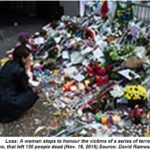 Thinking about the Pavilion’s divergent scenes—my experience there as compared to the rally—is instructive.As an attorney and former police officer, I have worked within and helped maintain the established system of government for most of my adult life. My training in public policy has given me a good understanding of the big picture. Practicing law has opened my eyes to the importance of details and the system’s legal framework. In addition, working the streets as a police officer gave me unique insight, including a glimpse into the seediness of human nature and its implications. (Photo: Loss: A woman stops to honor the victims of a series of terror attacks in Paris, France, that left 130 people dead (Nov. 16, 2015).Source: David Ramos/Getty Images)
Thinking about the Pavilion’s divergent scenes—my experience there as compared to the rally—is instructive.As an attorney and former police officer, I have worked within and helped maintain the established system of government for most of my adult life. My training in public policy has given me a good understanding of the big picture. Practicing law has opened my eyes to the importance of details and the system’s legal framework. In addition, working the streets as a police officer gave me unique insight, including a glimpse into the seediness of human nature and its implications. (Photo: Loss: A woman stops to honor the victims of a series of terror attacks in Paris, France, that left 130 people dead (Nov. 16, 2015).Source: David Ramos/Getty Images)
The most recent events at the Pavilion provide perspective on our modern world—and portend dangerous times ahead.This conclusion echoes a Foreign Policy article provocatively titled “The Collapse of the Liberal World Order.” In it, the author cited liberal New York Times writer, Roger Cohen, who stated that “the forces of disintegration are on the march,” and “the foundations of the post-war world…are trembling.”
Compare this assessment with that of author Peggy Noonan. From her more conservative worldview emerges a snapshot remarkably similar to her liberal counterpart: “Everything feels upended, the old order that has governed things for 70 years since World War II being swept away. Borders have disappeared before our eyes. Terrorism, waves of immigration transforming whole nations, Islam at war with itself and parts of it at war with the world. In the West, the epochal end of public faith in institutions, and a dreadful new tension between the leaders and the led.”
Both sides of the ideological aisle agree that something is wrong. If the established system, by which peoples, nations and the world maintain order, is being challenged—or even shaken—what can we expect?The short answer…it will get worse before it gets better!
From 9/11 to Hope and Change
My entire experience in public policy has taken place in a post-9/11 world. I defended my doctoral dissertation on the subject of securing American streets on September 10, 2001—just one day before the largest terror attack in the 21st century on U.S. soil. Little could I have imagined that less than 24 hours later this subject would become so relevant.
Looking back 15 years, September 11 was the first domino to fall in a linked sequence of events. The world order began to change. Subsequent situations further stressed the status quo.In pursuit of 9/11 mastermind Osama bin Laden, the U.S. and its allies waged war against the Taliban in Afghanistan. Early successes there led to the establishment of an interim Afghani government.
Soon after this, the U.S. decided to also enter Iraq and toppled the government of dictator Saddam Hussein in a little over a month.The leader’s ouster planted seeds in the minds of citizens of surrounding nations, but these would not germinate for a number of years. The immediate effect of Hussein’s downfall was a power vacuum that forced U.S. troops to continue there.
The Iraq War quickly became an albatross around the neck of the president and the nation. Five years of headlines—mostly negative—drained the American people. As society coped with the daily spate of terror attacks against American troops, any connection between the Iraq War and 9/11 was gradually rejected. Many disputed any connection at all. In short, 9/11 pushed the West to shake the established systems in both Afghanistan and Iraq. This sent ripple effects across the region.
With the instability of a prolonged war and the start of the Great Recession, America was ready for a change when the 2008 election came around. The contrast was stark. The Bush “war presidency” coupled with the fiscal crisis withered against Obama’s “Hope and Change” campaign theme. They were perfect political bookends.
After eight troubled years, Americans hoped President Obama would stop the bloodshed and funds expended in foreign wars, and bring balance to foreign policy for the world’s most powerful nation. Yet, instead, a radical shift in public policy took place.
As the Obama administration began to unwind what was done by its predecessor, it made a rigid distinction between the wars in Iraq and Afghanistan. The Iraq War was said to “cause” terrorism. The war in Afghanistan was seen as taking the fight to the enemy by not allowing the country to continue as a safe haven for terrorists.
Shortly into his presidency, Mr. Obama made it clear that the Iraq War would end and, as promised, all American troops exited Iraq by December 2011. (Yet 4,000 soldiers have since been sent back there and the war in Afghanistan continues to this day).
Arab Spring to ISIS
In recent years, journalists and pundits have more openly connected Saddam Hussein’s 2003 ouster from Iraq and the phenomenon known as the Arab Spring, which took place in 2011. In a 2013 New York Times opinion piece, Iraqi scholar Kanan Makiya stated that the actions in Iraq eight years earlier “paved the way for young Arabs to imagine” a life of “dignity and respect” without autocratic rule. Yet the attempt to spread democracy in one nation eventually shattered stability in an entire region.
With all large-scale social movements, many elements are needed for “combustion.” The “spark” that launched the Arab Spring came from one man’s decision to light himself on fire. It quickly resulted in the removal of the Tunisian president—and the overturning of another established government in the Middle East.
The trigger was just one dramatic event, but it led to a major regional shake-up. Like dominoes, leaders throughout the region fell from power. Protests spread to Oman, Bahrain, Yemen, Algeria, Iraq, Jordan, Morocco, Libya and Egypt. Underlying the unrest was widespread disaffection regarding unemployment, economic stagnation, repressive governments, and dictatorial leaders.
In February 2011, 18 days of protests led to the resignation of Egyptian president Hosni Mubarak after nearly 30 years in office. The most populous country in the Arab world had seen the fall of its leader.Three decades of leadership were shattered in just under three weeks.
In June 2011, Ali Abdullah Saleh, the president of Yemen for over 20 years, was injured in a failed assassination attempt. (He eventually resigned in February 2012.) Two months later, in August 2011, a battle erupted between loyalists of Libyan President Moammar Gadhafi and rebels opposing him. Gadhafi was killed shortly thereafter.
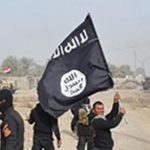 The idea of shaking the system to effect positive change was not limited to the Middle East. America wrestled with Occupy Wall Street protests that swept the country in late 2011—a backlash of the financial crisis.
The idea of shaking the system to effect positive change was not limited to the Middle East. America wrestled with Occupy Wall Street protests that swept the country in late 2011—a backlash of the financial crisis.
The Occupy movement was directly inspired by protests in the Middle East. Its de facto website stated: “We are using the revolutionary Arab Spring tactic to achieve our ends and encourage the use of nonviolence to maximize the safety of all participants.” While not nearly as traumatic as what was occurring halfway around the world, the Occupy movement did reveal one thing: a revolutionist mindset is, in some measure, present in contemporary America and Western countries. (Photo: Fractured borders: Iraqi government forces celebrate while holding an ISIS flag after retaking control of once ISIS-held territory northeast of Baghdad, Iraq (Jan. 26, 2015).Younis Al-Bayati/AFP/Getty Images).
Coming off the momentum created by the Arab Spring, violent protests spread to yet another country—Syria. But the standing government did not immediately fold as in previous cases. The unrest eventually led to armed conflict between the government and protesters. Syrian President Bashar al-Assad blamed foreigners for the dispute. As these events played out, many outside the region did not fully grasp the Arab Spring’s negative ramifications. Many even cheered these “democratic” movements.
The Wall Street Journal quoted President Obama: “We have the chance to show that America values the dignity of the street vendor in Tunisia more than the raw power of the dictator…America must use all our influence to encourage reform in the region.”
President George Bush reached a surprisingly similar conclusion. He wrote a glowing editorial in The Wall Street Journal stating: “America does not get to choose if a freedom revolution should begin or end in the Middle East or elsewhere. It only gets to choose what side it is on…It takes courage to ignite a freedom revolution. But it also takes courage to secure a freedom revolution through structural reform. And both types of bravery deserve our support.”
Inherent in this last quote is the important connection between structural reform and the rule of law—a tenet of public policy. The idea of freedom with no established system of government leads to turmoil. Thus the political shake-ups that occurred in the Middle East, which resulted in a loss of leaders and systems that had been in place for decades, mostly resulted in chaos and disorder.
In July 2012, the Red Cross officially declared the Syrian uprising a “civil war.” On September 11 of that same year, Islamic militants killed the U.S. ambassador to Libya and three others in Benghazi. World order was clearly continuing to unravel.
The Arab Spring, initially seen as a symbol of possibility and hope, eventually morphed into what is now called the Arab Winter, characterized by the return of authoritarianism and religious extremism.
By January 2014, conflict erupted between Syrian rebels and Islamists. A month later, almost the entire Egyptian government resigned. By June 2014, the Islamic State of Iraq and Syria, commonly called ISIS, declared a caliphate, or Islamic state, in parts of Syria and Iraq.
ISIS shocked the world with brutal, sadistic acts of violence that went well beyond those committed by al-Qaida. As egregious attacks mounted, the United States and some Arab countries were forced to launch air strikes against the terrorist group.In February 2015, after a video showing the beheading of 21 Egyptian Coptic Christians was met with horror and disgust, Egypt’s air force struck ISIS positions in eastern Libya.
But ISIS struck elsewhere. A few months later, another attack killed 38 people, mostly tourists, at a popular resort in Tunisia. It was the worst terror attack on the country’s soil. In the months to follow, the news went from bad to worse. ISIS continued wreaking havoc across the globe.
It orchestrated several attacks in Egypt’s Sinai Peninsula. Soon after, Russia carried out its first air strikes in Syria, allegedly targeting ISIS territories. (Western military sources contend the actual targets were anti-Assad rebels.) A month later, ISIS claimed responsibility for downing a Russian airliner in Sinai, killing 224 people.Then in a dramatic, multi-faceted attack, ISIS terrorists killed 130 in Paris in November 2015. The UK and France launched air strikes against ISIS in response.From there, the terrorist organization’s influence continued to grow.
Immigration, Terrorism and Brexit
With the Middle East practically on fire, casualties rose and chaos ruled. A mass exodus from Syria and other hotspots spread across the Middle East, and then north to Europe. The result was the worst immigration crisis since World War II.
According to BBC, over a million migrants crossed into Europe in 2015, with an additional 135,000 in the first two months of 2016. The vast majority came from three countries: Syria, Iraq and Afghanistan. In addition, ISIS openly declared it had enlisted fighters to pose as migrants to cause problems for Europe.
Large numbers of Muslim immigrants have not easily blended into the European landscape. Differences in language, religion, dress and culture are apparent and have led to division and, in some cases, outright mayhem.
Since the beginning of 2015, terrorism casualties in Paris (twice), Brussels (twice), and Nice resulted in at least 256 killed and 881 injured. On the second-year anniversary of the caliphate, ISIS-sponsored terrorists attacked Istanbul, killing another 44 and injuring at least 230.
A few weeks after the attacks, certain factions of the Turkish military staged a coup. As the only Muslim NATO country, Turkey may tip the delicate balance in Europe and within NATO. As of this writing, the immediate outcome is that the coup failed, but longer-term implications are not yet clear.
Terrorism, along with notorious crimes committed by immigrants such as sexual assaults, is having widespread impact. Nationalistic and right-wing groups are standing up and readying themselves to retaliate. Many worry that their countries will be taken over by “foreign invaders.”
Make no mistake. Whether homegrown or foreign, terrorism changes the psyche of a society. It is intended to do so. Typically, victims are random, even irrelevant. The sinister goal is to bring fear to those who witness or learn of the acts. The adage that “terrorism is primarily theater” makes this clear.
In America, since the beginning of 2015, 85 have been killed and 99 injured in terrorist attacks that include Orlando, San Bernardino, and several less dramatic incidents.The political impact of these attacks is significant. What was once largely isolated to Israel, Iraq and other Mideast countries is happening in Western countries. Let this reality settle in your mind. It is inevitable—and an integral part of the shake-up occurring everywhere.
The UK voting to exit the European Union (Brexit) is a direct result of this dynamic. A Wall Street Journal analysis concluded that it was “the most powerful demonstration yet of a rising populist tide transforming the established order across the West…[and was] perhaps the single largest blow the British populace has delivered to its establishment in modern history.”
The implications of Brexit are best summarized in a Bloomberg piece: “Brexit’s real importance probably comes not from its direct effects, but from its symbolism. It’s a sign of a much bigger, broader trend—a global political regime change. The shift was happening before Brexit, and it will continue after. It’s something we should be worried about.”
While the exact impact of Brexit is still in the making, the EU will never be the same. The cumulative effect of these dominoes is a revolution within the established world order. This “system” is already trembling! Looking into the immediate future, one can predict that Afghanistan will fall back into Islamists’ hands after Western troops leave. With Iraq again subject to daily terror attacks, American troops have returned to help fend off ISIS—including some of the very soldiers that they themselves trained to be part of Iraq’s army!
To remove ISIS from Iraq, a larger American troop presence will be needed. ISIS has recently lost some territory, however, this was accomplished because Iraq “partnered” with Iran-backed Shiite militias.Iran, the world’s greatest sponsor of terrorism, is newly awash in resources from sanction relief. Tehran just announced it had 100,000 missiles aimed at Israel.These are just some of many in the Gordian knot of challenges that lie ahead!
The System and the Campaign
Think back to the Pavilion. Everything explained to this point is a backdrop for the current American presidential campaign.
The canceled Trump rally magnified a deeply divided country. A Wall Street Journal article described the 2016 presidential campaign like a “trip from Venus to Mars.” The competing campaigns must maneuver around or within prevailing anti-establishment themes. These directly indict—and even target—the system!
Members of both political parties see the problem as “the system,” similar to those who challenged the governments in the Middle East and parts of Europe. Referring to the elites, the institutions, and the legal and political establishment in America, the system is under scrutiny, even attack.
Even casual spectators of the political scene detect a distrust toward government. Anger prevails—with anti-establishment themes animating both parties. More than any election in recent history, except possibly 1968, which exploded in violence at the Democratic convention in Chicago, this election will test the system.
Indeed, for many, the system itself is the target! For others, the desire is to save the system and address the problems that come as a result of it. Aptly summarized, this campaign is between those wanting to save the country versus those wanting to change the country.
This is not to say that the system is perfect. Far from it. Having spent 40 years of study and experience within this flawed system, I do not defend it. One is reminded, though, of the words of Winston Churchill, who declared that “democracy is the worst form of government, except for all the others.”
As this historic presidential campaign takes shape, advocates on both sides reflect sincere, yet distinct, worldviews. People would be wise to consider the lessons of history. It is replete with “good intentions,” resulting in unintended consequences.
Political violence has already erupted in San Diego, San Jose, and Albuquerque—to name a few. Violence is seen by some as “required” for political change. Tragic examples include the assassination of five Dallas police officers at a Black Lives Matter protest, and three police officers in Baton Rouge, the site of a police killing that went viral.
For obvious reasons, these killings sent shockwaves throughout law enforcement circles. Police officers, often considered the canaries in the coal mine, are the most visible representatives of the system. Attacks on police are a leading indicator of what will occur within the larger society.
Officials braced themselves for chaos during party conventions in Cleveland and Philadelphia. All the ingredients for violence were present: anger, fear, ideological divide, and anti-establishment sentiment.Yet these factors transcend politics and will soak into mainstream society—and most likely spill onto the streets within a matter of time.
In short, this presidential campaign, like few others, is ripe for clashing ideologies seeking leverage and ultimately political power. With so much at stake—coupled with a climate of distrust or even disdain for the system—one is hard-pressed to explain why violence would not occur.
It now seems that citizens in nations across the globe are seeking a better system. Many appear ready to resort to violence to bring about such change.Another adage is appropriate: be careful what you ask for!
Better System Coming
Having connected the dots in this collapsing world order, it is time for a real answer. It is simple: mankind cannot solve its myriad of problems! While talented—and stubborn—it is not capable of fixing the system.As many contend, the system is indeed broken. Despite what leaders believe, or what people desire, mankind does not have the answers.
Yet there is a source that has the solutions so many seek. The Holy Bible uniquely explains the answers to all of these problems—including the challenge of calming a shaken world. It connects the dots and reveals that not only were our modern circumstances foretold, but also how these times of trembling will play out.
In Haggai 2:6, God declares: “For thus says the Lord of hosts; Yet once, it is a little while, and I will shake the heavens, and the earth, and the sea, and the dry land.”Man thinks he can shake the established system to bring positive change. God disagrees. He says that He will shake the Earth!
Verse 7 repeats for emphasis: “And I will shake all nations, and the desire of all nations shall come…says the Lord of hosts.”Everyone desires peace and prosperity. Only God can deliver it. As world order continues to unravel and fear reigns, people will seek the “desire of all nations”—Jesus Christ!
Look for two things to happen in the coming years: (1) order throughout the globe will continue to crumble, leading to war, conflict and disarray, and (2) a message about Christ establishing a perfect supergovernment on Earth will reach all nations.
Both of these trends are discussed in Matthew 24: “And you shall hear of wars and rumors of wars…For nation shall rise against nation, and kingdom against kingdom: and there shall be famines, and pestilences, and earthquakes, in diverse places” (vs. 6-7).
During this turbulent time, a message of hope will be spread across the Earth: “And this gospel of the kingdom shall be preached in all the world for a witness unto all nations; and then shall the end come” (vs. 14).
The Bible says that Christ’s kingdom will start small (Matt. 13:31). He will begin it from a small and humble “flock” (Luke 12:32). It will continue to grow in size and strength until Christ directly intervenes in world affairs. This phase of His kingdom will demonstrate the awesome power of God.Because God’s kingdom is tiny when it begins, most will not answer the gospel message when it first goes out. Yet, after a period of tremendous hardship, all nations will desire for Christ to reign.
Leading up to this triumphant moment, the world order will continue to be stressed and shaken. For those in America and other Western countries, the normalcy of life will change. People will live in a constant state of fear.Indeed, fear will be “the new normal.” Terror will defeat all attempts for peace and security. Life, as we now expect and to which we have grown accustomed, will change.
The dynamic of a terroristic environment is ripe with suspicion toward others, especially those who are “not like you.” This will foster deeper divisions in already fractured societies—which as a consequence will generate even more fear!
As the “guardians” (police, security and military personnel) are targeted, they will become increasingly anxious and stressed. More “bad shootings” will occur because these guardians will be focused on self-protection as opposed to public safety. This will further drive a wedge between them and the community they are tasked to protect, which will become a vicious cycle.
Fear and distrust create momentum that sustains itself. The world is entering the worst time in human history. In other words, things will get very bad. However, the situation will eventually get better—actually better than anyone can imagine. For those who see it coming, take heart. It is all part of God’s Plan. For those who may be confused or even afraid, there is still time to change your life—and your destiny.
Connecting these dots ought to be a wakeup call that time is short. Seek truth. Ask God to help you understand. Visit the websites of The Restored Church of God—the publisher of this magazine. Read the Church’s literature, watch The World to Come videos, and contact us to seek counsel from one of our ministers.
What is forthcoming is not a pretty picture, but God wants everyone to be saved (I Tim. 2:4). Those who understand what God has in mind know that good news follows the terrible events that will shake this world.

